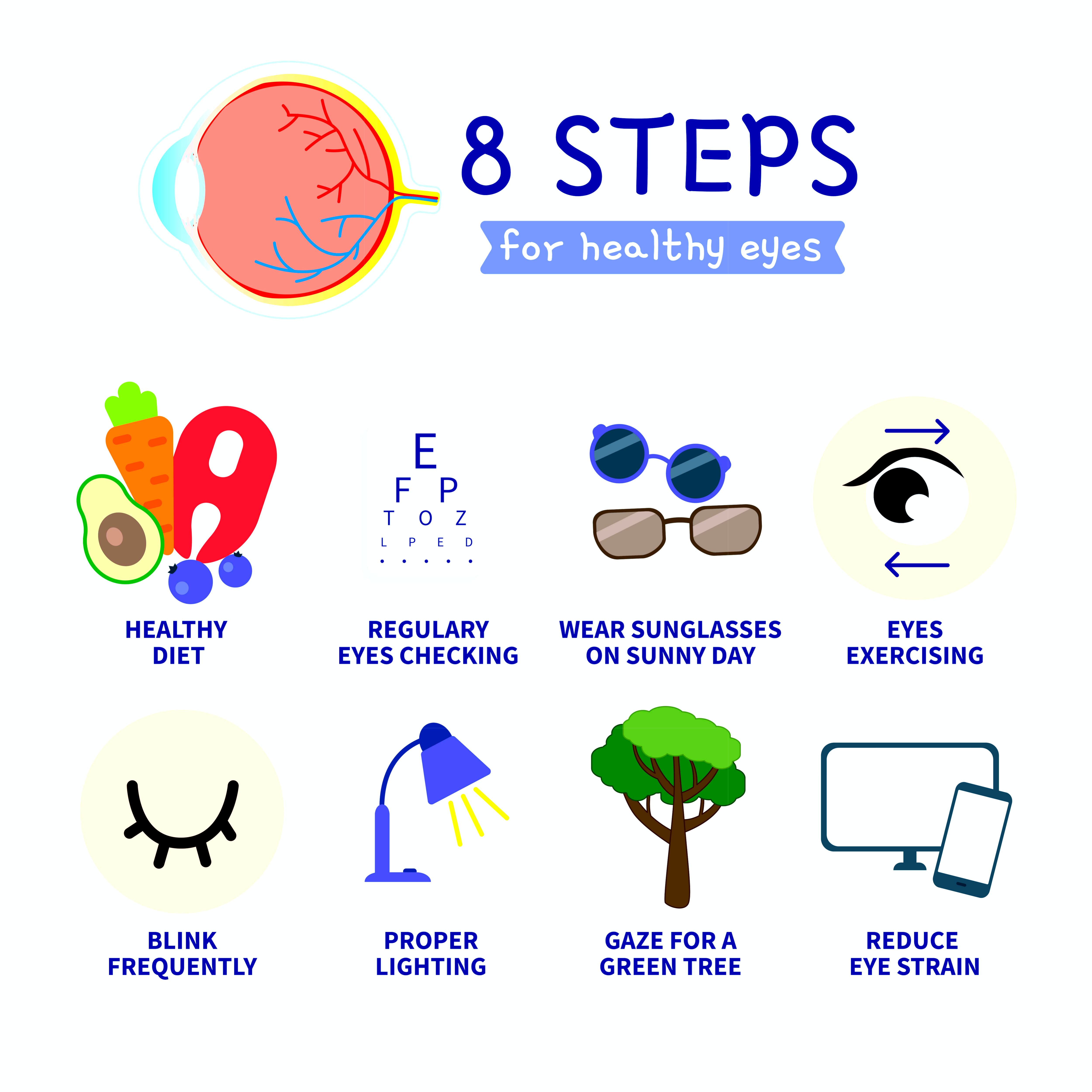All Categories
Featured
Healthy vision is a foundation of top quality of life, yet lots of people underestimate the significance of nutrition in maintaining eye wellness. A diet regimen rich in certain nutrients can protect your eyes, decrease the threat of establishing usual eye conditions, and support total ocular feature. Allow's explore how nutrition effects your vision and the crucial nutrients you need to include in your daily dishes.
Vital Nutrients for Eye Health And Wellness
Vitamin A. Understood for its function in maintaining vision, vitamin A is critical for preserving a healthy cornea and making it possible for low-light vision. Deficiency in vitamin A can bring about night blindness and various other severe eye problems. Outstanding sources include carrots, sweet potatoes, and dark leafy environment-friendlies.
Lutein and Zeaxanthin. Found in high concentrations in the retina, these antioxidants protect against damages brought on by blue light and oxidative stress and anxiety. Consuming foods like spinach, kale, broccoli, and eggs can help keep your eyes healthy.
Omega-3 Fat. Omega-3s are essential for the health of the retina and can help in reducing signs and symptoms of dry eye syndrome. Consist of fatty fish such as salmon, tuna, and mackerel in your diet, or select plant-based resources like chia seeds and walnuts.
Vitamin C. A powerful anti-oxidant, vitamin C supports the wellness of capillary in the eyes and might minimize the threat of cataracts. Foods abundant in vitamin C include oranges, strawberries, bell peppers, and tomatoes.
Vitamin E. This nutrient secures eye cells from oxidative damage. Incorporate almonds, sunflower seeds, and avocados into your meals to boost vitamin E degrees.
Zinc. Zinc plays a key function in moving vitamin A from the liver to the retina, assisting in the manufacturing of melanin, a protective pigment in the eyes. Foods such as oysters, beef, and strengthened grains are excellent sources.
![]()
Avoiding Eye Conditions Via Diet Plan
Macular Degeneration: Antioxidants like lutein, zeaxanthin, and vitamins C and E can help slow the progression of age-related macular deterioration (AMD)
Cataracts: Ample consumption of vitamin C and various other anti-oxidants may delay the beginning or stop of cataracts.
![]()
Dry Eyes: Omega-3 fats help enhance tear high quality and ease dry eye signs and symptoms.
Diabetic Retinopathy: A diet reduced in refined sugars and rich in entire foods can help manage blood sugar levels, lowering the threat of this problem in people with diabetic issues.
Practical Nutrition Tips
Diversify Your Diet Plan: Include a selection of fruits, veggies, lean healthy proteins, and entire grains to guarantee you're obtaining a vast array of nutrients.
Limitation Processed Foods: Reduce intake of sugarcoated and undesirable fats, which can add to systemic health concerns affecting your eyes.
Keep Hydrated: Correct hydration supports tear production and stops eye dry skin.
Take Into Consideration Supplements: If your diet lacks certain nutrients, speak with a doctor regarding taking supplements for much better eye health.
Final Thought
![]()
Good nourishment is a necessary aspect of keeping optimal eye wellness. By incorporating nutrient-dense foods into your diet, you can minimize the threat of eye conditions and safeguard your vision for the long term.
Vital Nutrients for Eye Health And Wellness
Vitamin A. Understood for its function in maintaining vision, vitamin A is critical for preserving a healthy cornea and making it possible for low-light vision. Deficiency in vitamin A can bring about night blindness and various other severe eye problems. Outstanding sources include carrots, sweet potatoes, and dark leafy environment-friendlies.
Lutein and Zeaxanthin. Found in high concentrations in the retina, these antioxidants protect against damages brought on by blue light and oxidative stress and anxiety. Consuming foods like spinach, kale, broccoli, and eggs can help keep your eyes healthy.
Omega-3 Fat. Omega-3s are essential for the health of the retina and can help in reducing signs and symptoms of dry eye syndrome. Consist of fatty fish such as salmon, tuna, and mackerel in your diet, or select plant-based resources like chia seeds and walnuts.
Vitamin C. A powerful anti-oxidant, vitamin C supports the wellness of capillary in the eyes and might minimize the threat of cataracts. Foods abundant in vitamin C include oranges, strawberries, bell peppers, and tomatoes.
Vitamin E. This nutrient secures eye cells from oxidative damage. Incorporate almonds, sunflower seeds, and avocados into your meals to boost vitamin E degrees.
Zinc. Zinc plays a key function in moving vitamin A from the liver to the retina, assisting in the manufacturing of melanin, a protective pigment in the eyes. Foods such as oysters, beef, and strengthened grains are excellent sources.

Avoiding Eye Conditions Via Diet Plan
Macular Degeneration: Antioxidants like lutein, zeaxanthin, and vitamins C and E can help slow the progression of age-related macular deterioration (AMD)
Cataracts: Ample consumption of vitamin C and various other anti-oxidants may delay the beginning or stop of cataracts.

Dry Eyes: Omega-3 fats help enhance tear high quality and ease dry eye signs and symptoms.
Diabetic Retinopathy: A diet reduced in refined sugars and rich in entire foods can help manage blood sugar levels, lowering the threat of this problem in people with diabetic issues.
Practical Nutrition Tips
Diversify Your Diet Plan: Include a selection of fruits, veggies, lean healthy proteins, and entire grains to guarantee you're obtaining a vast array of nutrients.
Limitation Processed Foods: Reduce intake of sugarcoated and undesirable fats, which can add to systemic health concerns affecting your eyes.
Keep Hydrated: Correct hydration supports tear production and stops eye dry skin.
Take Into Consideration Supplements: If your diet lacks certain nutrients, speak with a doctor regarding taking supplements for much better eye health.
Final Thought

Good nourishment is a necessary aspect of keeping optimal eye wellness. By incorporating nutrient-dense foods into your diet, you can minimize the threat of eye conditions and safeguard your vision for the long term.
Latest Posts
Reliable Industrial Roofing Solutions by Weathercraft
Published May 27, 25
1 min read
How Regular Auto Maintenance at Montclare Auto Repair Keeps Your Wallet Happy
Published May 26, 25
1 min read
Find Premier Car Repair Solutions in Chicago – Expert Care for Your Vehicle
Published May 25, 25
1 min read
More
Latest Posts
Reliable Industrial Roofing Solutions by Weathercraft
Published May 27, 25
1 min read
How Regular Auto Maintenance at Montclare Auto Repair Keeps Your Wallet Happy
Published May 26, 25
1 min read
Find Premier Car Repair Solutions in Chicago – Expert Care for Your Vehicle
Published May 25, 25
1 min read